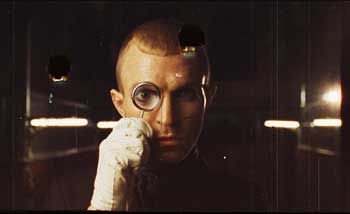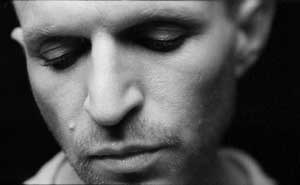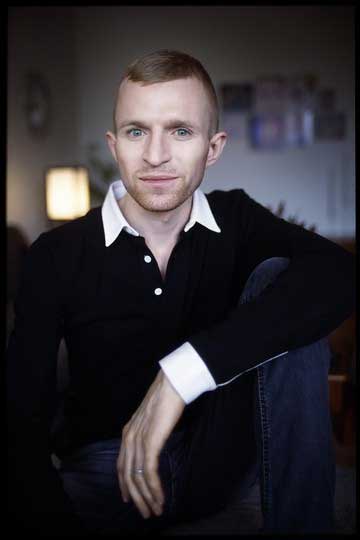Grand
feelings
I have no idea what it feels like
being famous. I have never been a
pop star, a celebrated fashion model
or an it-boy of the month. My joys
and sorrows mean the world to me,
but their proportions are, to be perfectly
honest, very modest to anyone except
for myself. I guess it is the same
for anybody, that Britney Spears’
feelings when throwing up in an Dutch
coffee shop are just as banal as the
next lowly backpackers’. Still,
damaged by cinema from an early age,
I cannot quite get rid of the idea
of rumbling bass and lush strings
coloring the experiences of the larger-than-life
crowd. Having gotten to a certain
age, I’ve grudgingly accepted
the fact that those strings are absent
from every important occasion in my
emotional life, though the mood can
sometimes be artificially injected
with the help of headphones and some
Schubert or so.
Nowhere are those grand feelings more
present than in the songs of Jay-Jay
Johanson. In the lyrics of ”Kate”
he regrets having to leave his lover
to meet the crowds calling out his
name outside. In other songs on the
compilation ”Prologue”,
the narrator drifts restlessly between
the great metropolises of the world
and bemoans the passing of more colorful
days. Though on top of the world,
the narrator is drifting, restless
and romantically, decadently unhappy
in a way that appears almost desirable.
The mood is somber almost without
exception, sometimes even desperate,
as with the cover of ”Automatic
Lover”. Whatever the mood though,
it is always elevated to the cinematic
hyper-unreal level that only a feeling
accompanied by a string orchestra
seems to be able to reach. It has
been that way, in fact, ever since
Jäje (as the Swedes know him)
first stepped into the studio to record
his first album ”Whiskey”.
– That was back in 1995 and
I wasn’t even sure if I wanted
to sing myself, Jäje Johanson
says over the phone. I thought maybe
I’d let some female singer do
it. Anyway I had no idea how I should
sing. So, what you’re hearing
on the album is me trying different
styles of singing.

Help
from Kent's Sami Sirviö
He is referring somewhat apologetically
to the Ol’ Blue Eyes-style vocals
of his breakthrough single ”So
Tell the Girls That I Am Back in Town”.
The new 2004 version of the song has
Jäje singing in his own voice
without Sinatra mannerisms, and the
drowsy jazz elements for which his
music was justifiably compared to
Portishead, have been scrapped in
favour of brisk guitars and keyboards,
courtesy of producer and Kent guitarist
Sami Sirviö. Yet the cinematic
aura has remained present on all the
records he has made to date. Like
Sinatra, Johanson stands with one
foot in music and one in cinema. Perhaps
it is simply because he never got
to write a lot of proper movie scores.
That is after all exactly what Jäje
Johanson has been dreaming of.
– I talked to several directors
in 2000-2001, people like Lars von
Trier who I really like. I was also
planning something with Hal Hartley,
but in the end nothing came out of
any of those projects. Now I’m
getting a lot of offers from German
directors, but they don’t sound
very interesting. Also, I didn’t
feel quite comfortable with the one
soundtrack I wrote for this French
director, Ilan Cohen. Some directors
are protective of their babies, and
when people like me come in to meddle
with them it really disturbs them.
So I don’t know. Bernard Herrmann
had to fight with Hitchcock too. Maybe
directors should just score their
movies themselves.
Drinking
with Daft Punk
The film scores of Bernard Herrmann
would in fact point the way when Jäje
Johanson directed his jazzy lounge
music in a slightly darker direction
on “Poison” (2000). But
rather than working with film directors,
Jäje has searched out musical
directors to help him take his music
in new directions. The trip hop tag
may still have been bothering him
when he sought out the forerunners
of modern dance music for help in
recording “Antenna”. Daft
Punk proved to be more interested
in drinking beer with Jay-Jay than
producing his album, so assistance
was instead recruited from German
IDM duo Funkstörung. The attention
given to their intricate sound engineering
on tracks like “Wonderful Combat”
would probably have been greater if
it wasn’t for the two attention
grabber singles “Automatic Lover”
and “On the Radio”, produced
by Martin Landquist (a k a Nåid)
as stylish fusions of classic electro
pop and disco. In the year of electroclash,
those songs made Jay-Jay Johanson
a cheap imitator to some, and in particular
to the style police in Sweden.
– It was so infuriating, Jäje
Johanson almost moans. If the guys
from Funkstörung had read those
Swedish reviews they would have been
pissed. They are so far from that
kind of trend. I would have wanted
to have more focus on the tracks they
did, but all the attention was directed
to those Nåid songs, which were
in a simpler disco style.
Still, Sweden finally started to open
up commercially with the release of
”Antenna”, and the timing
was good since Jäje had just
ended his long exile in Strassbourg
and returned to Stockholm.
– I only went because of my
girlfriend, in the first place, even
if France was the first country that
opened up to my music. When that relationship
ended there wasn’t any reason
for me to stay in France. I’m
much more comfortable living in Sweden
and then going to France a lot. I
recently played my first gig in Sweden
since the Lollipop festival in 1996.
Let’s hope it doesn’t
take eight more years until the next
one.

Andreas
Tilliander co-operation
Wherever he may perform, speculating
about Jäje in the following eight
years is tough; his music will probably
change as much as it did between ”Whiskey”
and ”Antenna”, into some
new electronic hybrid form. ”Prologue”
– which is mainly aimed at the
American market where all his previous
records are set for release for the
first time – contains a guest
appearance that Jäje did on an
album by Sweden’s premier glitch
artist Andreas Tilliander. Naked over
the sparse tapestry of crackling and
irregular beats, Johanson's vocals
really shine in their desolation,
and ”Rescue Me Now” points
out a possible new direction for him,
particularly since Tilliander’s
promising label buddy Johan Skugge
has become part of the Johanson tour
band.
– I’m also working with
him on my new demo. He is incredibly
gifted! Now he is handling beats and
some pads and things on stage, but
I hope that we will be doing a lot
of work together further on. I’ve
also been talking to some French guys,
in the same circles as Daft Punk,
about production, so anything can
happen. I’m hoping to increase
the BPM rate on the next album closer
to 118 than 56 like it has usually
been in the past. It should be more
danceable and less moody. More ”Computer
World” than ”Electric
Cafe”, if you see what I mean.
Thus grandness and melancholy may
turn out to no longer be the right
words for describing the music of
this once so world weary pop dandy.
A new change is no doubt ahead, and
a quite new artist might be waiting
on the other side of it. That is one
of the charms of Jay-Jay Johanson.
|
|
Read
more
Read our review of
Jay-Jay Johanson's "Antenna"
here. |
